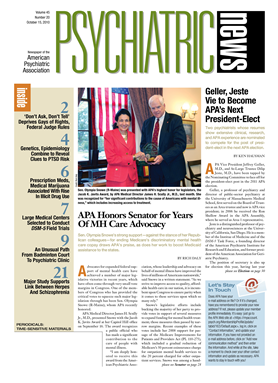Both low and high concentrations of neonatal vitamin D were associated with increased risk of schizophrenia in an individually matched case-control study of a large Danish birth cohort.
Neonates with concentrations of 25 hydroxyvitamin D3 in the three lowest quintiles—as measured in dried neonatal blood samples—had a significantly increased risk of schizophrenia compared with those in the fourth quintile. Surprisingly, neonates in the fifth or highest quintile also had a significantly increased risk, according to a report in the September Archives of General Psychiatry.
Lead author John McGrath, M.D., of the Department of Psychiatry at the University of Queensland, Australia, and colleagues said that the association between high concentrations of vitamin D and schizophrenia is surprising, but not without precedent: similar nonlinear U-shaped relationships (in which high and low concentrations are more significantly associated with an outcome than concentrations in the middle range) have been found between vitamin D and neonatal growth outcomes, and in some adult studies between vitamin D and cancer and cardiovascular disease.
The authors urged caution in the interpretation of the result, saying the U-shaped relationship could reflect underlying genetic predispositions requiring gene-by-environment studies to elucidate.
However, severely low concentrations of vitamin D have been associated with a range of disorders, including neurologic and neuropsychiatric disorders, and the current study strongly underscores the possibility of its involvement in some cases of schizophrenia, they suggested.
“Of particular interest to the hypothesis linking vitamin D deficiency and schizophrenia, the enzyme required for the production of [vitamin D] has now been identified in the human brain, and there is evidence from rodent models demonstrating that transient prenatal vitamin D deficiency results in persistent changes in adult brain structure, neurochemistry, and behavior,” the authors wrote.
In the study, 424 individuals with schizophrenia and 424 controls matched for sex and date of birth were compared for concentrations of neonatal vitamin D using measurements taken from dried neonatal blood samples. These dried blood spots have been systematically collected from individuals born in Denmark since May 1, 1981, and stored in the Danish Newborn Screening Biobank.
(In a study published in May this year in Paediatric Perinatal Epidemiology titled “The Utility of Neonatal Dried Blood Spots for the Assessment of Neonatal Vitamin D Status,” McGrath and colleagues showed that dried neonatal blood spot levels of vitamin D are significantly related to mothers' levels and to infant cord blood.)
Vitamin D concentrations were grouped within five quintiles: less than 19.7 nonmoles per liter (nmol/L), 19.7 to 30.9 nmol/L, 31.0 to 40.4 nmol/L, 40.5 to 50.9 nmol/L, and 51 nmol/L or greater.
Compared with neonates in the fourth quintile (between 40.5 and 50.9 nmol/L), those in each of the lower three quintiles had a twofold elevated risk of schizophrenia. Those in the highest quintile also had a significantly increased risk, a little less than twofold.
McGrath told Psychiatric News that vitamin D levels in the study are treated as a continuous variable and that while lower neonatal levels were found associated with higher risk for disease, it is only one of many factors influencing progression to schizophrenia. “Of course, schizophrenia is a heterogenous disease, and no one in the field believes that any one factor can explain all schizophrenia,” he said.
But in the Archives report, McGrath and colleagues noted that schizophrenia is associated with a substantial burden of disability and that in the absence of major advances in the efficacy of treatments, interventions that offer the prospect of reducing the incidence of the disorder should be pursued vigorously. “It is acknowledged that there is an urgent need to undertake more research that focuses on the environmental risk factors and gene [by] environmental associations with schizophrenia,” they said.
“Mindful of these issues, we note that hypovitaminosis D is prevalent in many societies and is a particular concern in pregnant and lactating women. From a public-health perspective, the chance to prevent a serious disorder like schizophrenia via simple, safe, and cheap nutritional supplements is a scenario that has not previously seemed plausible.
“While there is much more work to be done, if future studies confirm the association between developmental vitamin D deficiency and risk of schizophrenia, it raises the tantalizing prospect of the primary prevention of this disabling group of brain disorders in a manner comparable with folate supplementation and the prevention of spina bifida.”
